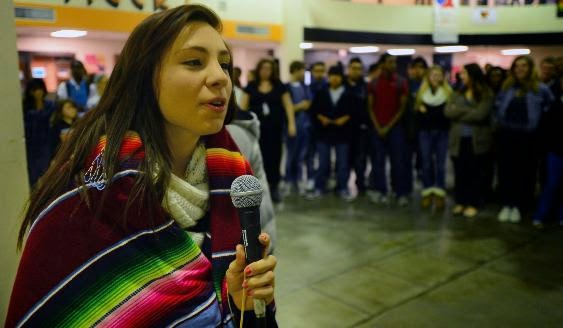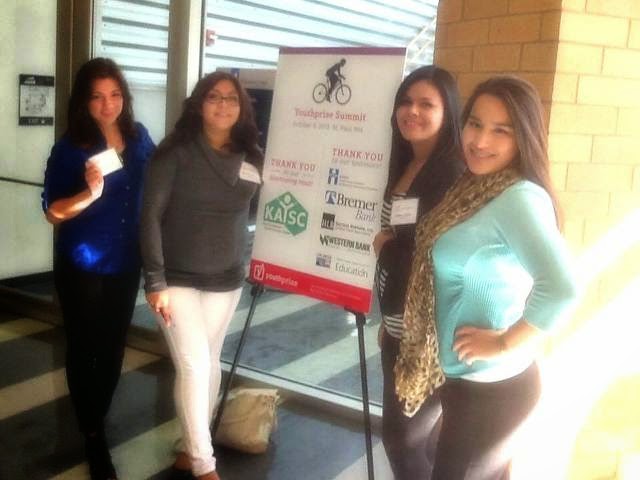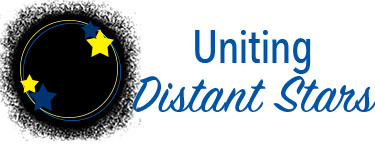
Young Leaders Series Part 2: Advocating for Cultural Education for High School Students
Wenonah successfully led a peaceful walk-out when her high school’s beloved All Nation’s program had been slowly dismantled due to lack of support. This program promoted the Native American culture, such as smudging and drumming. These are vital rituals for cleansing and uplifting one’s spirit. Moreover, this act of civil disobedience was equally organized to learn and appreciate other cultures within their school. In the last few decades, Minnesota is home to a growing immigrant and refugee community that has led to greater diversity within its schools.
 |
| Wenonah talk during the Student assembly during the peaceful demonstration to restore the All Nations Program. |
Wenonah, a proud member of the Ojibwe and Oneida Nations, is actively involved in volunteering and community service. She is currently designing a program through Youthprise that focuses on out-of-school programs to improve academic performance “inside” the classroom for Native youth within her community. She is a mentor and also running workshops at an event called “Sacred Voices” for Native youth in middle and high schools.
 |
| Wenonah at the left with her Youthprise group. |
Her passion is improving the opportunities for young people. Her ultimate goal is to work with Native Youth to guide them in reaching their unique potential. She is currently attending Minneapolis Community Technical College to complete a degree in Human Services and Native Studies. She plans to continue her education at the University of Minnesota.
I was introduced to Wenonah through her mom, Lynette, via Facebook. Lynette and I had worked together for a few years at Mystic Lake Casino Hotel. It was exciting to connect with Wenonah through Facebook, because I witnessed her organize this walk-out from the start to finish. It was quite inspiring to watch this young woman follow her heart and accomplish something that mattered to the well-being of her fellow Native students. This event spotlighted how Native American culture had been systematically stripped away by the forces of colonialism and religious assimilation for over four centuries–when the first European settlers arrived in North America.
She held a clear vision for this demonstration that restoring the All Nation’s Program became the primary objective. As she organized the day’s activities on Monday, March 11, she had the opportunity to meet with her Principal Cecilia Saddler, who allowed them to have an assembly in the auditorium and a round dance in the main commons area. Based on this effort of good faith, Wenonah called off the walk-out and commenced with the peaceful demonstration within the allotted area of the school. Approximately 1,000 students participated from various cultures and backgrounds.
Wenonah spoke at the assembly as cited by the Twin Cities Daily Planet: “Over the years, we have not been able to smudge, not be able to drum.
We are segregated from the rest of the school. You guys don’t hear about
us unless it’s something negative. We want stability in our program.
We want teachers that respect us. We are not the only culture at our
school that feels judged or discriminated. I am sick of being ignorant
of other cultures. I’m sick of others of being ignorant of my culture.”
Later on, Wenonah started receiving texts from fellow students stating they were not able to leave class to attend the assembly and this precipitated the walkout. About 300 students ventured outside for the walk-out to show their solidarity. They were later informed they would not be allowed back in the school if they participated. This is when local advocates intervened to offer their service. Most notably was Mysnikol Miller, who negotiated with the administration that the students’ would be able to collect their personal belongings before returning home.
 |
| KFAI Radio interview with the students on their activism at South High School. Wenonah is seated second from the left. |
Since this courageous act of leadership, Wenonah had other opportunities come her way. She was interviewed by the well-known Native activist Winona LaDuke for her success with her peaceful demonstration. She also participated in the Circle of Healing with Diane Wilson, an author of Spirit Car: Journey to a Dakota Past. Both of the opportunities allowed Wenonah to share her experience in leading a movement that promoted the positive aspects of culture and cultivated harmony among a diverse community.
The success of this civil disobedience moved the All Nation’s program in the forefront of issues facing the students at South High School. Though there were ideas in the works to revitalize this program, this student activism prompted a quicker implementation. Wenonah’s leadership in bringing voice to her and her fellow students forced the decision makers to pay attention. It was through her work and others who assisted in organizing this demonstration that showed that the voices and views of young people equally matter.
UDS is very grateful to learn more of Wenonah’s pursuits in life. She is a young person who leads by example and a strong role model for her peers in her community and around the world. We asked her
four questions that would encourage other young people to become advocates by
sharing her experience and insight that has guided her journey as a change-maker.
1)
When did you first discover your desire to advocate for Native Youth and
realized that this was a path you wanted to take and why?
I have always wanted to work in my Native community. I come from a
family who was heavily involved with AIM (American Indian Movement),
and in the Native community. It wasn’t until I had enough of the
dysfunction and institutional racism that “we the students” faced in our
school that I realized I needed to make a change. I loved organizing and making sure there was change for students who come into the
All Nations program. That is when I realized what exactly I wanted to
do in my community; this passion to serve is what I fell in love with.
2)
What are the top three influences that supported your drive to be a change
agent and why?
Seeing students who were younger than me struggle to achieve in
school. It was frustrating to witness so many kids being transferred and
mistreated. I couldn’t watch it happen anymore or contribute to
the dysfunction by not doing anything. I had Native women in my
community who fully supported me, especially one of importance–Missy
Whiteman. I vented to her my frustrations. I told her that I wanted to be a change, and she fully supported and encouraged me to do it! She
was the first person I spoke to on organizing this protest.
3) In dealing with the barriers of age and race, what are some strategies you have applied to overcome them?
Age was a huge barrier. I was organizing to promote change, and put some
heat under the seats of “professional” adults. They thought they could
deter my efforts from following through with the protest; they tried “negotiating”
with me to save face. They were not doing their job, and they were
intimidated by a high school student who did not take “no” for an
answer. I just had to keep on with my plan…be firm, be smart, and
be strong.
4)
As someone who successfully led a group of people to promote positive change,
what would be your five top recommendations that you would give a rising star
that may feel hindered by any social biases?
1: Connect and start conversations with those who feel the same way as you do–people who also seek the same change.
2: Try to ask questions of the right people about certain problems that you observe happening. Push for answers. Push for change.
3: Don’t hold back; don’t let anyone tell you that you can’t make a change. Be strong.
4: Be peaceful; violence can influence negative reactions and sometimes the
opposite outcome occurs of what was originally intended. As a minority myself, I
understand the frustration and even the anger at times, but it is truly
important to stay peaceful
5: Know your resources and who the right people are to talk with that can help or support the change that is needed.
UDS Thanks Wenonah for sharing her incredible story to inspire
others to realize their true potential and taking action to create positive changes in this world. Also, we wish her all the best as she
continues with her passion to engage and guide her fellow Native youth in becoming shining Stars!!!
